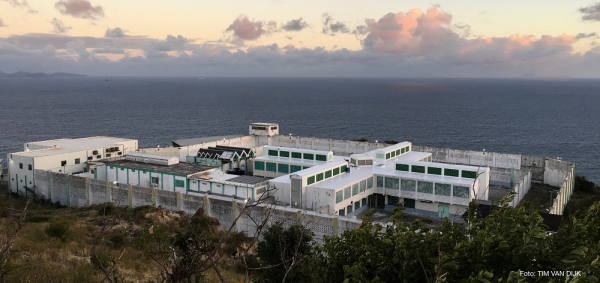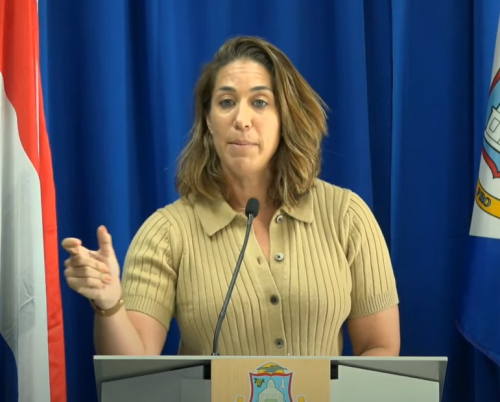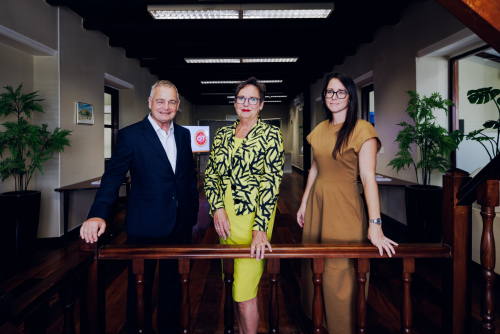 PHILIPSBURG:--- The Pointe Blanche Prison, a cornerstone of St. Maarten's justice system, has become a glaring symbol of dysfunction, mismanagement, and misplaced priorities. With over 300 individuals languishing on a waiting list to serve their sentences, the island's justice system is teetering on the brink of collapse. Meanwhile, dangerous criminals are being deported to live freely in their home countries, while non-violent offenders, including politicians and white-collar criminals, are left to rot behind bars. This is not just a crisis of capacity—it is a crisis of justice.
PHILIPSBURG:--- The Pointe Blanche Prison, a cornerstone of St. Maarten's justice system, has become a glaring symbol of dysfunction, mismanagement, and misplaced priorities. With over 300 individuals languishing on a waiting list to serve their sentences, the island's justice system is teetering on the brink of collapse. Meanwhile, dangerous criminals are being deported to live freely in their home countries, while non-violent offenders, including politicians and white-collar criminals, are left to rot behind bars. This is not just a crisis of capacity—it is a crisis of justice.
A System Buckling Under Pressure
Minister of Justice Nathalie Tackling admitted to the dire state of the prison system but offered little in the way of concrete solutions. The overcrowding at Pointe Blanche has forced the Prosecutor’s Office to make impossible decisions, such as deporting armed robbers to make room for rapists. These are not decisions that inspire confidence in the justice system; they are decisions that highlight its failure.
The Minister’s acknowledgment that she does not have access to critical data, such as the exact number of people on the waiting list to serve their sentences, is deeply troubling. How can a system function effectively when its leaders are operating in the dark? The lack of transparency and accountability is a slap in the face to the citizens of St. Maarten, who deserve a justice system that works for them, not against them.
Early Release: A False Hope or a Mismanaged Solution?
The early release program, often touted as a potential solution to the overcrowding crisis, has been shrouded in confusion and secrecy. Minister Tackling has repeatedly stated that early release is not the solution, citing legal constraints. However, this claim does not hold water when compared to the practices in Curacao and the Netherlands, which operate under the same rules and regulations. Both jurisdictions have successfully implemented early release policies to alleviate prison overcrowding, yet St. Maarten remains paralyzed by inaction.
The Minister has admitted to using a policy that allows for early release after serving 60% or even 50% of a sentence, but she has failed to provide any transparency about how this policy is applied. Who is eligible for this discount? What criteria are used to determine eligibility? These are questions that remain unanswered, leaving the public in the dark and fostering a sense of mistrust.
The lack of transparency is particularly egregious given the dire consequences of the current system. Recently, three armed robbers were released just three days before their court dates and deported to Trinidad due to a lack of cell space. Why were these individuals prioritized for release over inmates who have already served more than 50% of their sentences? Why is ankle monitoring, a solution successfully used in Curacao and the Netherlands, not being implemented in St. Maarten? These are questions that demand answers.
In Curacao, the overcrowding issue was addressed by granting all inmates who demonstrate good behavior an additional 15% discount on their sentences. This means that inmates serve 2/3 of their time, plus an extra 15% discount, allowing for a more humane and efficient system. Why has St. Maarten not adopted a similar approach? The Minister’s refusal to provide clarity on her policies only deepens the public’s frustration and erodes trust in the justice system.
A Tale of Two Justices
Perhaps the most egregious aspect of this crisis is the glaring disparity in how justice is administered. Foreign criminals who commit heinous acts, such as armed robbery and attempted murder, are deported to live freely in their home countries. Meanwhile, individuals convicted of non-violent crimes, such as vote-buying, are left to languish in prison or on a waiting list. This two-tiered system of justice is not only unfair but also deeply damaging to the social fabric of St. Maarten.
Some detainees have already served their sentences but remain incarcerated due one reason or another. These individuals have paid their debt to society, yet they are being denied their freedom because of administrative incompetence and a lack of political will to address the root causes of the crisis.
The Human Cost of Inaction
Overcrowding at Pointe Blanche is not just a logistical issue; it is a humanitarian crisis. The conditions at the prison are deplorable, with inmates crammed into spaces that are unfit for human habitation. The psychological toll on those waiting to serve their sentences, as well as on those who have already served their time but remain incarcerated, is immeasurable.
Minister Tackling’s recent trip to the Netherlands to plead for assistance highlights the desperation of the situation. However, her admission that other countries within the Kingdom of the Netherlands are also at maximum capacity underscores the need for St. Martin to take ownership of its problems. Relying on external help is not a sustainable solution.
A Broken System
The current system is riddled with inconsistencies and favoritism. Reports suggest that individuals who are on the “good side” of the Prosecutor’s Office are released quickly, while others are left to languish. This lack of a proper and transparent policy has created a system where justice is not only delayed but also denied.
The foreign detention center, which the Minister has pointed to as a potential solution, has been deemed by judges to not meet acceptable standards. This raises further questions about the Minister’s understanding of the situation and her ability to address it effectively.
A Call to Action
The time for excuses and half-measures is over. The government of St. Martin must take immediate and decisive action to address the overcrowding crisis at Pointe Blanche Prison. This includes:
- Investing in Infrastructure: The construction of additional prison facilities must be expedited to alleviate the current overcrowding.
- Reforming Sentencing Policies: Non-violent offenders should be given alternative sentences, such as community service or house arrest, to free up space for dangerous criminals.
- Implementing Transparent Policies: The Ministry of Justice must provide clear and transparent guidelines on the early release program, including eligibility criteria and the decision-making process.
- Adopting Proven Solutions: St. Martin should look to Curacao and the Netherlands for best practices, such as ankle monitoring and additional sentence discounts for good behavior.
The people of St. Martin deserve a justice system that is fair, transparent, and effective. The current state of affairs is a betrayal of those principles. Minister Tackling’s acknowledgment of the problem is a start, but words are not enough. It is time for action—bold, decisive action—to restore faith in the justice system and ensure that St. Martin remains a safe and just society for all.
 PHILIPSBURG:--- The Minister of Justice, Natalie Tackling, delivered a comprehensive update on the progress and reforms underway in St. Maarten's justice system. Addressing the media and the public, Minister Tackling emphasized her commitment to fairness, progress, and action, while tackling misinformation and political distractions.
PHILIPSBURG:--- The Minister of Justice, Natalie Tackling, delivered a comprehensive update on the progress and reforms underway in St. Maarten's justice system. Addressing the media and the public, Minister Tackling emphasized her commitment to fairness, progress, and action, while tackling misinformation and political distractions. PHILIPSBURG:--- The Pointe Blanche Prison, a cornerstone of St. Maarten's justice system, has become a glaring symbol of dysfunction, mismanagement, and misplaced priorities. With over 300 individuals languishing on a waiting list to serve their sentences, the island's justice system is teetering on the brink of collapse. Meanwhile, dangerous criminals are being deported to live freely in their home countries, while non-violent offenders, including politicians and white-collar criminals, are left to rot behind bars. This is not just a crisis of capacity—it is a crisis of justice.
PHILIPSBURG:--- The Pointe Blanche Prison, a cornerstone of St. Maarten's justice system, has become a glaring symbol of dysfunction, mismanagement, and misplaced priorities. With over 300 individuals languishing on a waiting list to serve their sentences, the island's justice system is teetering on the brink of collapse. Meanwhile, dangerous criminals are being deported to live freely in their home countries, while non-violent offenders, including politicians and white-collar criminals, are left to rot behind bars. This is not just a crisis of capacity—it is a crisis of justice. Willemstad:--- The amount Curaçao spends on healthcare is relatively high. In 2023, this amount was approximately 14.7 percent of the GDP, much higher than, for example, Aruba (8.7%) or Sint Maarten (6.5%). This jeopardizes expenditure on other policy areas and leads to high tax and premium burdens. As investigated by the CBCS, the aging of the population further increases the pressure on the healthcare system. It is anticipated that a solution for the CMC’s financial issues will also lead to additional costs for the country. Therefore, Curaçao must make choices. Taking measures now to increase efficiency in healthcare may reduce some of the pain in future years.
Willemstad:--- The amount Curaçao spends on healthcare is relatively high. In 2023, this amount was approximately 14.7 percent of the GDP, much higher than, for example, Aruba (8.7%) or Sint Maarten (6.5%). This jeopardizes expenditure on other policy areas and leads to high tax and premium burdens. As investigated by the CBCS, the aging of the population further increases the pressure on the healthcare system. It is anticipated that a solution for the CMC’s financial issues will also lead to additional costs for the country. Therefore, Curaçao must make choices. Taking measures now to increase efficiency in healthcare may reduce some of the pain in future years.